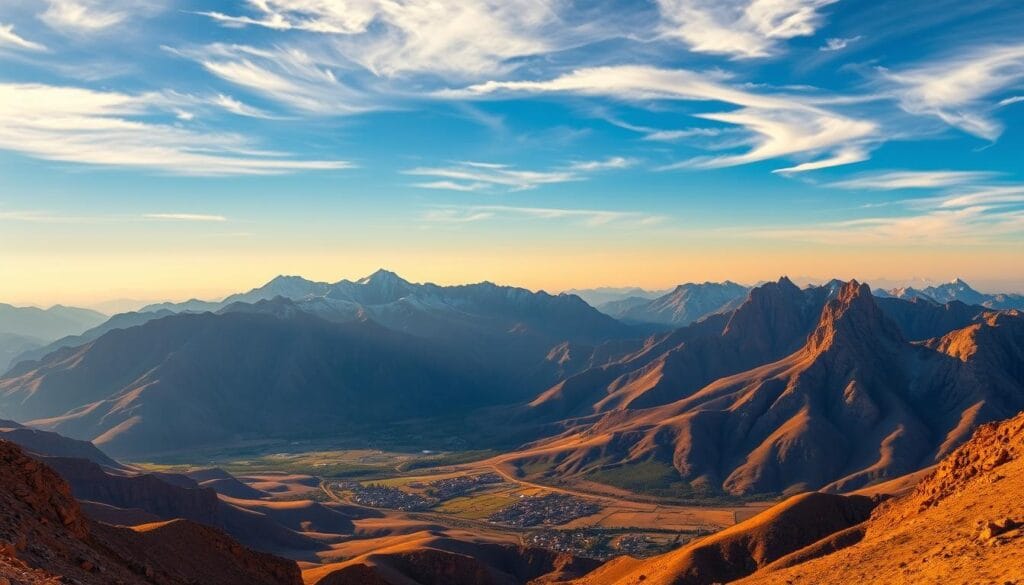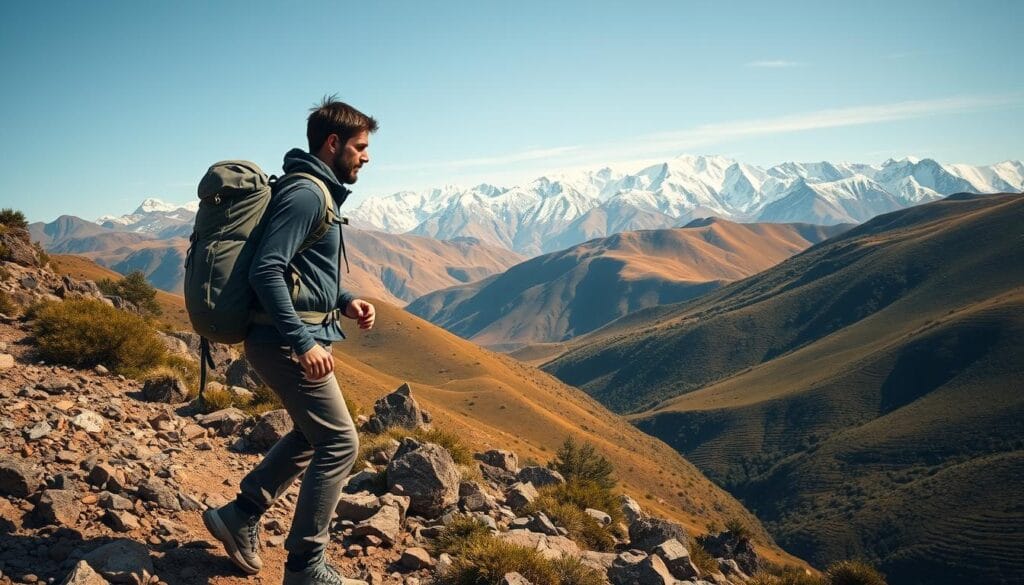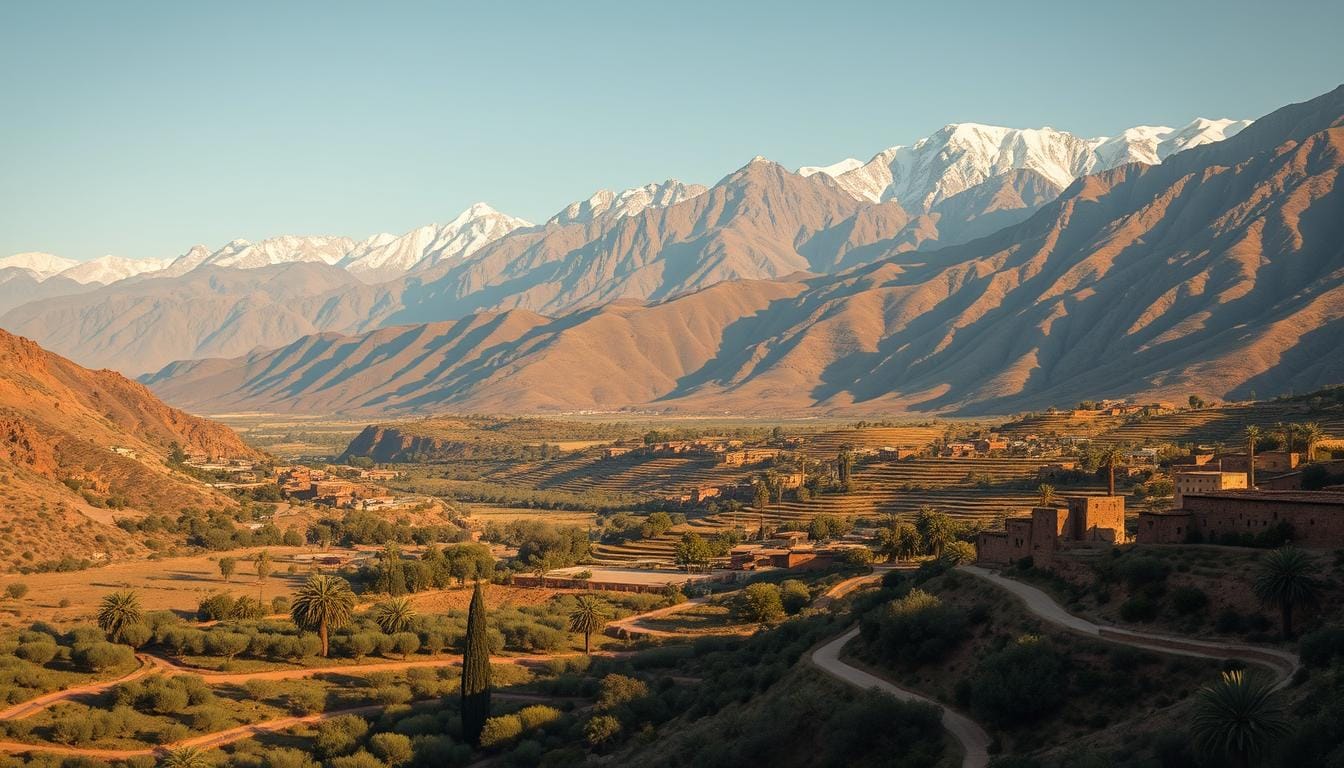Atlas Mountains Morocco: Everything You Need to Know Before You Go
Atlas Mountains Morocco. Imagine trekking through stunning landscapes and immersing yourself in rich cultural heritage. The rugged beauty of North Africa awaits you. As you plan your adventure, it’s essential to know what to expect from this incredible destination.
You’ll have the opportunity to explore traditional Berber villages, hike through scenic valleys, and experience the warm hospitality of the local people. With so much to see and do, being prepared is key to making the most of your journey.
From the best times to visit to the top outdoor activities and cultural experiences, this guide will walk you through everything you need to know before you go.
Table of Contents
ToggleIntroduction to the Atlas Mountains in Morocco
Located in the heart of North Africa, the Atlas Mountains are a majestic mountain range that stretches across Morocco. This mountain range is not just a geographical wonder but also a culturally rich and diverse region.
Atlas Mountains Morocco: A geographical overview
The Atlas Mountains are divided into several ranges, with the High Atlas being the highest and most rugged section. The High Atlas is home to Mount Toubkal, the highest peak in the range, standing at 4,167 meters. The mountain range stretches for approximately 2,500 kilometers, creating a dramatic landscape that varies from lush valleys to snow-capped peaks.
The geography of the Atlas Mountains is characterized by:
- Diverse ecosystems ranging from Mediterranean to alpine
- Rugged terrain with numerous valleys and gorges
- Rich biodiversity, including unique flora and fauna
Cultural significance
The Atlas Mountains are culturally significant as they are home to the Berber communities, who have preserved their traditions and way of life. The Berbers have a rich cultural heritage, with their own language, customs, and crafts. Visitors to the region can experience this rich culture firsthand by visiting Berber villages and engaging with the local communities.
Some of the cultural highlights include:
- Traditional Berber villages where you can experience local hospitality
- Local crafts such as weaving, pottery, and woodcarving
- Festivals and celebrations that showcase Berber culture
Climate and weather patterns
Understanding the climate and weather patterns of the Atlas Mountains is crucial for planning your trip. The weather can vary significantly with the seasons, ranging from hot summers to cold, snowy winters. The best time to visit depends on your preferences and the activities you have planned.
Key weather considerations include:
- Spring (March to May) is ideal for hiking and trekking
- Summer (June to August) is hot in the lower valleys but pleasant at higher altitudes
- Autumn (September to November) offers mild temperatures and beautiful foliage
- Winter (December to February) is the best time for snow sports in the High Atlas
Best Times to Visit the Atlas Mountains
If you’re planning a trip to the Atlas Mountains, understanding the best times to visit is crucial for making the most out of your adventure. The Atlas Mountains, a vast and majestic mountain range, offer diverse experiences across different seasons, making it a year-round destination for various types of travelers.
Seasonal Highlights
The Atlas Mountains experience a range of climates, from Mediterranean to desert-like conditions, depending on the season. Spring (March to May) is considered one of the best times to visit, with mild temperatures and beautiful landscapes. It’s ideal for hiking and trekking, especially if you’re planning to conquer Mount Toubkal, the highest peak in the Atlas range.
Summer (June to August) can be quite hot, especially in the lower valleys, but it’s a great time to enjoy the local festivals and events that take place in the region. If you’re looking for a more relaxed atmosphere, the higher altitudes offer cooler temperatures.
Autumn (September to November) is another excellent season, with comfortable temperatures and the added beauty of changing foliage. It’s a great time for outdoor activities like hiking and exploring the local Berber villages.
Winter (December to February) brings snow to the higher elevations, making it a perfect time for winter sports like skiing. However, some areas may be inaccessible due to heavy snowfall.
Local Festivals and Events
The Atlas Mountains are not just about natural beauty; they’re also home to a rich cultural heritage. Visiting during local festivals and events can add a unique dimension to your trip. For example, the Marrakech Popular Arts Festival usually takes place in July, showcasing local music, dance, and crafts.
Other events, like the Imilchil Wedding Festival, offer a glimpse into local traditions. Although it’s not directly in the Atlas Mountains, it’s worth considering if you’re in the region around September.
Participating in or simply observing these events can enrich your understanding of the local culture and make your visit even more memorable.
Popular Destinations within the Atlas Mountains
As you explore the Moroccan mountains, you’ll discover a range of exciting destinations that cater to different interests and preferences. The Atlas Mountains are a treasure trove of cultural, natural, and adventurous experiences, making them an ideal location for travelers.
Marrakech as a Gateway
Marrakech is a vibrant city that serves as a common gateway to the Atlas Mountains. Known for its bustling souks, rich history, and dynamic culture, Marrakech is a city that seamlessly blends traditional and modern elements. Visitors can explore the historic medina, visit iconic landmarks like the Koutoubia Mosque, and enjoy the city’s renowned cuisine.
From Marrakech, travelers can easily access the surrounding mountains, making it an ideal starting point for Atlas trekking adventures and other outdoor activities.

Imlil and Mount Toubkal
Imlil is a charming village located at the foot of Mount Toubkal, the highest peak in the Atlas Mountains. It’s a popular destination for hikers and trekkers, offering a range of trails that cater to different skill levels. The village itself is picturesque, with traditional Berber houses and a relaxed atmosphere.
Atlas trekking in the Mount Toubkal region is a must-do experience for adventure seekers. The trails offer breathtaking views of the surrounding mountains and valleys, as well as opportunities to engage with local Berber communities.
The Ourika Valley
The Ourika Valley is a scenic region known for its picturesque landscapes, traditional Berber villages, and rich cultural heritage. Visitors can explore the valley’s many villages, visit historic sites, and enjoy the local cuisine. The valley is also a great destination for hiking and trekking, with trails that offer stunning views of the surrounding mountains.
- Explore traditional Berber villages and experience local culture.
- Enjoy hiking and trekking opportunities in a scenic mountain landscape.
- Visit historic sites and landmarks in the region.
The Ourika Valley is a hidden gem within the Moroccan mountains, offering a unique blend of natural beauty and cultural richness.
Outdoor Activities in the Atlas Mountains
With its rugged terrain and breathtaking landscapes, the Atlas Mountains are a haven for outdoor enthusiasts. The range offers a diverse array of activities that cater to different interests and skill levels, making it an ideal destination for adventure seekers.
Hiking and Trekking Options
The Atlas Mountains are renowned for their hiking and trekking trails, which range from gentle day hikes to multi-day treks. One of the most popular hikes is the Mount Toubkal hike, which takes you to the highest peak in North Africa. The trails offer breathtaking views of the surrounding valleys and mountains, and the opportunity to experience the local Berber culture.
Guided tours are available for those who prefer to explore with an experienced guide, or you can plan your own itinerary. The trails vary in difficulty, so whether you’re a seasoned hiker or just starting out, there’s a trail that’s right for you.
Rock Climbing Adventures
For those seeking a more adrenaline-pumping experience, the Atlas Mountains offer exciting rock climbing opportunities. The rugged terrain provides a variety of climbing routes for different skill levels, from beginner-friendly ascents to challenging climbs for experienced climbers.
Local guides and tour operators offer guided climbing excursions, providing equipment and instruction to ensure a safe and enjoyable experience. Whether you’re looking to push your limits or simply enjoy the thrill of climbing, the Atlas Mountains have something to offer.
Winter Sports Opportunities
In the winter months, the Atlas Mountains transform into a snow-covered paradise, offering opportunities for skiing and snowboarding. The mountains receive a good amount of snowfall, making them ideal for winter sports enthusiasts.
Several ski resorts, such as Oukaïmeden, provide facilities for skiers and snowboarders, including equipment rentals and lessons. Whether you’re a seasoned skier or just starting out, the Atlas Mountains offer a fun and invigorating winter sports experience.
Accommodation Options in the Atlas Mountains
Whether you’re looking for comfort, authenticity, or adventure, the Atlas Mountains have various accommodation options to suit your needs. The region offers a diverse range of places to stay, from luxury hotels and traditional riads to cozy guesthouses and cabins.
Hotels and Guesthouses
In Marrakech, the gateway to the Atlas Mountains, you’ll find a plethora of modern hotels and luxurious riads. These establishments offer comfort and convenience, with many providing stunning views of the surrounding mountains.
Luxury hotels in Marrakech are known for their opulence, offering amenities such as spas, pools, and fine dining restaurants. On the other hand, guesthouses in the rural areas and villages provide a more authentic experience, allowing you to engage with local communities.
Unique Stays like Riads and Cabins
For a truly immersive experience, consider staying in a traditional riad or a cozy cabin. Riads, with their characteristic architecture, offer a glimpse into Moroccan culture, while cabins nestled in the mountains provide a serene retreat.
- Riads in Marrakech offer a blend of traditional and modern amenities.
- Cabins in the Ourika Valley provide a peaceful escape amidst nature.
- Guesthouses in Imlil serve as a base for hiking and trekking adventures.
Choosing the right accommodation can significantly enhance your experience in the Atlas Mountains, whether you’re looking for relaxation, adventure, or cultural immersion.
Local Cuisine in the Atlas Mountains
As you explore the High Atlas, you’ll discover a culinary landscape rich in Berber traditions and Moroccan flavors. The region’s cuisine is a reflection of its cultural heritage, with dishes that have been passed down through generations. You can experience this rich culinary culture by trying traditional dishes and visiting local markets.
Flavors of Tradition
When visiting the Atlas Mountains, be sure to try some of the local specialties. Tagines and couscous are staples of Moroccan cuisine, often made with locally sourced ingredients such as vegetables, meats, and dried fruits. You might also encounter pastilla, a savory pie made with layers of flaky pastry, meat, and spices.
- Tagine with chicken, olives, and preserved lemons
- Couscous with vegetables and spices
- Pastilla with meat and onions
Exploring Local Markets
Visiting local markets is a great way to immerse yourself in the culture and cuisine of the High Atlas. You’ll find a variety of fresh produce, spices, and local handicrafts. Dining in traditional riads or local eateries can also provide a memorable culinary experience, allowing you to enjoy local dishes in an authentic setting.
Cultural Experiences and Local Communities
As you explore the Atlas Mountains, you’ll have the opportunity to experience the rich cultural heritage of the Berber communities. The Atlas Mountains are home to a diverse array of Berber villages, each with its own unique traditions and customs.
Berber Villages and Their Traditions
Visiting Berber villages can be a rewarding experience, offering insights into their way of life. You can witness traditional Berber architecture, explore local markets, and interact with the friendly villagers. Some popular villages to visit include those near Mount Toubkal, the highest peak in the Atlas Mountains.
Craftsmanship and Local Artisans
The Berber communities are known for their exceptional craftsmanship, including textiles, pottery, and silverwork. You can explore local workshops and markets to discover unique handicrafts and support local artisans. By purchasing their products, you contribute to the local economy and take home a piece of Berber culture.
| Craft | Description | Typical Products |
|---|---|---|
| Textiles | Traditional Berber weaving techniques | Rugs, blankets, clothing |
| Pottery | Handmade ceramics using local materials | Pottery, vases, decorative items |
| Silverwork | Intricate jewelry making using silver | Neckpieces, earrings, pendants |
By engaging with the local communities and appreciating their craftsmanship, you can create meaningful connections and memories during your visit to the Atlas Mountains.
Tips for Traveling in the Atlas Mountains
As you prepare for your journey to the Atlas Mountains, it’s essential to understand the nuances of traveling in this majestic Moroccan mountain range. The Atlas range offers a unique blend of natural beauty and cultural richness, making it a rewarding destination for travelers.
Essential Gear and Packing List
Packing the right gear is crucial for a comfortable and enjoyable trip to the Atlas Mountains. Consider including sturdy hiking boots, layers for changing weather conditions, and sun protection in your packing list.
- Comfortable hiking boots or shoes
- Layers for varying weather conditions
- Sun protection (sunscreen, hat, sunglasses)
- Reusable water bottle
- First-aid kit
These essentials will help you navigate the terrain and enjoy the scenic beauty of the Atlas range.
Language and Communication Tips
While many locals in the Moroccan mountains speak some French or English, learning a few basic Arabic phrases can significantly enhance your interactions with the community.
Consider learning basic phrases like “hello” (مرحبا – marhaba), “thank you” (شكرا – shukraan), and “how much?” (كم ثمن هذا؟ – kam thaman hadha?). This effort will be appreciated by the locals and enrich your cultural experience.
By being prepared with the right gear and a willingness to engage with the local culture, you can have a more meaningful and enjoyable experience in the Atlas Mountains.
Safety Guidelines for Visiting the Atlas Mountains
The Atlas Mountains, with their breathtaking landscapes, demand respect and caution from visitors. Ensuring a safe and enjoyable experience in this beautiful region requires some preparation and awareness.
Health and Wellness Tips
When embarking on an Atlas trekking adventure, it’s crucial to be prepared for the challenges that come with high altitudes and changing weather conditions. Staying hydrated is essential, so make sure to drink plenty of water throughout your journey.
- Pack layers for your clothing to adjust to sudden temperature changes.
- Protect yourself from the sun with sunscreen, a hat, and sunglasses.
- Bring a first-aid kit with essentials like band-aids, antiseptic wipes, and any personal medications.

Navigating Rural Areas
Navigating the rural areas of the Atlas Mountains can be challenging, but with the right guidance, you can have a safe and enjoyable experience. Consider hiring a local guide or joining a guided tour, especially for Atlas trekking expeditions.
| Safety Measure | Description | Importance Level |
|---|---|---|
| Local Guide | Hiring a local guide familiar with the terrain and weather conditions. | High |
| Weather Forecast | Checking the weather forecast before heading out. | High |
| Emergency Kit | Carrying an emergency kit with essentials like food, water, and a first-aid kit. | High |
By following these safety guidelines and being mindful of your surroundings, you can have a safe and enjoyable experience in the Atlas Mountains.
Sustainable Tourism Practices
To ensure the long-term beauty and integrity of the Atlas Mountains, sustainable tourism practices are essential. As you explore this breathtaking region, you have the opportunity to make a positive impact on the local environment and communities.
Supporting Local Economies
One of the most effective ways to support sustainable tourism is by contributing to the local economy. This can be achieved by choosing local guides for your Atlas Mountains tours, staying in family-run accommodations, and purchasing products from local artisans. By doing so, you directly support the livelihoods of the people living in the Atlas Mountains.
For instance, opting for local guides not only enhances your experience with their in-depth knowledge of the region but also ensures that the economic benefits of tourism are retained within the community. Similarly, staying in locally owned riads or guesthouses helps in circulating money within the local economy.
| Local Economies Support Strategies | Benefits |
|---|---|
| Choosing Local Guides | Enhanced tour experience, direct economic support to local guides |
| Staying in Local Accommodations | Supports local families, promotes cultural exchange |
| Purchasing Local Products | Encourages local craftsmanship, supports artisans’ livelihoods |
Environmental Conservation Initiatives
The Atlas Mountains are not only culturally rich but also home to diverse flora and fauna. Environmental conservation is crucial to preserving the natural beauty of the region. Many tour operators and local organizations are involved in initiatives aimed at reducing the environmental impact of tourism.
Some of these initiatives include reducing waste, promoting eco-friendly practices, and protecting natural habitats. By choosing tour operators that adhere to these practices, you can contribute to the conservation of the Atlas Mountains’ environment.
When planning your Atlas Mountains tours, consider the environmental policies of your tour operators and accommodations. Look for certifications or endorsements that indicate a commitment to sustainability.
Conclusion: Your Adventure Awaits in the Atlas Mountains
As you prepare to embark on your journey to the Atlas Mountains, the excitement is palpable. With its diverse landscapes, rich cultural heritage, and wide range of outdoor activities, this Moroccan mountain range has something to offer every kind of traveler.
Key Experiences and Activities
From the thrill of hiking Mount Toubkal, the highest peak in North Africa, to exploring the vibrant souks and tranquil valleys, your adventure in the Atlas Mountains is sure to be unforgettable. You can immerse yourself in the local Berber culture, sample traditional cuisine, or simply take in the breathtaking scenery.
With the insights and tips provided in this guide, you’re now well-equipped to make the most of your trip. Whether you’re a seasoned hiker or just looking for a unique cultural experience, the Atlas Mountains are calling – it’s time to start planning your adventure and making memories that will last a lifetime.

